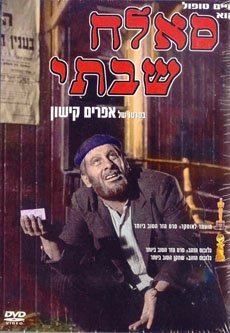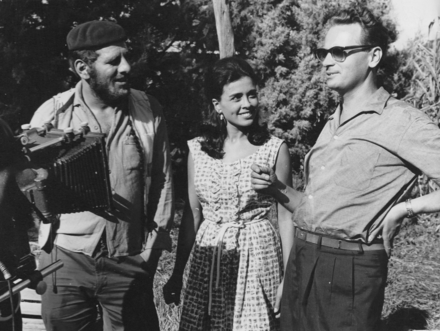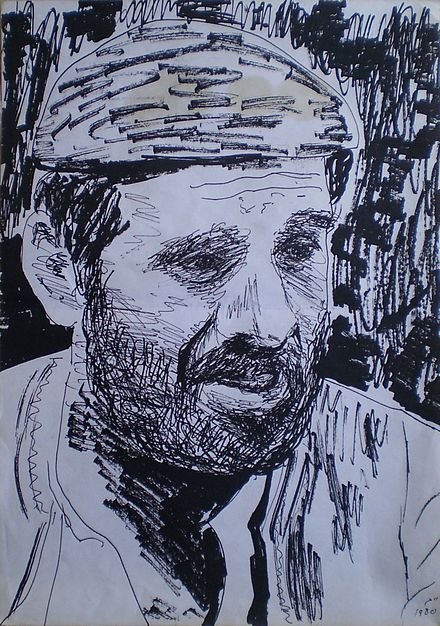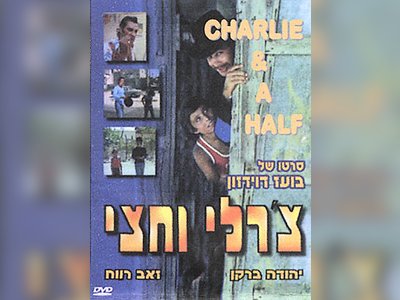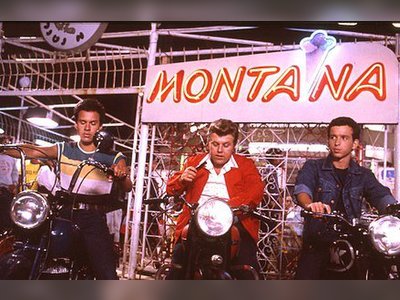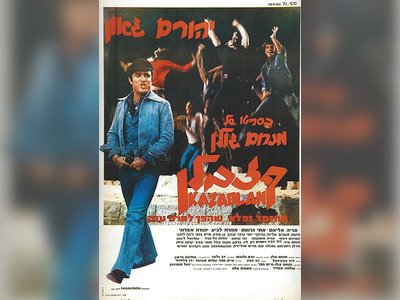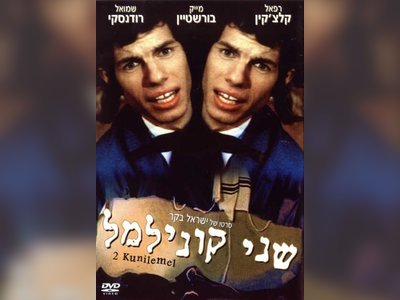מורשת גדולי האומה
בזכותם קיים
beta
Salach Shabati: A Landmark in Israeli Cinema
"Salach Shabati" stands as a significant milestone in Israeli cinema, both for its artistic achievements and its lasting impact on Israeli culture. It humorously and satirically portrayed the challenges faced by immigrants from the Middle East in Israel while also providing a critical commentary on the political and bureaucratic issues of the time. The film's success at home and abroad, as well as its adaptation into a musical, demonstrate its enduring legacy in Israeli entertainment history.
"Salach Shabati" is an Israeli comedy film directed by Ephraim Kishon and starring Haim Topol. It was released in 1964 and holds the distinction of being the first Israeli film to be nominated for an Academy Award for Best Foreign Language Film. Additionally, it won a Golden Globe Award for Best Foreign Language Film, marking a significant milestone in Israeli cinema. The film was later adapted into a musical.
The origins of "Salach Shabati" can be traced back to a skit written by Ephraim Kishon for the IDF entertainment troupe in 1955 as part of their eighth program, titled "Between Magal and Sword." The skit was originally called "Saadia and the Saadia." Building on the material from this early skit, Kishon created a full-length comedy film produced by Menachem Golan. The movie featured Haim Topol in the lead role, with supporting performances by Zaharira Harifai, Gila Almagor, Esther Greenberg, Eriq Einhorn, Shaike Levi, Geula Nuni, Shraga Friedman, and Mordechai Arnon. The film required 45 days of shooting and had a production cost of 400,000 Israeli pounds. Its premiere took place on June 2, 1964, at the Chen Cinema in Jerusalem, marking the beginning of its tremendous box office success. It sold 1,184,900 tickets, making it the third-highest-grossing film in Israeli history at that time. Film critic Shmuel Orr noted, "Despite its modest artistic value, 'Salach Shabati' broke all box office records... It is certain that 'Salach Shabati' will be the first Israeli film to cover all its production costs without any subsidies and generate significant profits for its producers." The film was also marketed internationally and found success in American cinemas, receiving two Golden Globe Awards nominations and an Oscar nomination for Best Foreign Language Film.
The story is set in the 1950s, shortly after the establishment of the State of Israel, and satirically portrays the challenges faced by immigrants from the Middle East and their interactions with native-born Israelis. It highlights the bureaucratic hurdles and the often less-than-pristine politics of the era through the character of Salach, a newcomer to Israel who must quickly adapt to Israeli life with his extended family.
Ephraim Kishon drew inspiration for the character of Salach from his own experiences as a new immigrant when he and his family settled in the Haifa suburb of Kiryat Haim in 1949. Some view Salach's name as symbolic, humorously suggesting "I'm sorry I came," echoing the phrase "I'm sorry I'm alive" (after the Six-Day War, Kishon published a humorous book titled "I'm Sorry We Won").
The film was shot using an "Arriflex" camera at the Herzliya Studios, the only film camera available in Israel at the time. Consequently, the film could only be shot for five days a week since the camera was used for newsreel filming on the sixth day. Certain scenes were filmed in the interior of the green village, a settlement that appears in the movie and was located in the Yad Hakesem neighborhood in Herzliya. To accommodate the filming, a set was constructed in the Eucalyptus Grove in Herzliya, including a reconstruction of the immigrant transit camp complete with tents and huts designed by Yosef Karel.
"Salach Shabati" was nominated for an Academy Award in the Best Foreign Language Film category. It won two Golden Globe Awards, one for Best Foreign Language Film and another for Best Actor, awarded to Haim Topol.
In the early 1980s, the Bimah Theater decided to stage a musical adaptation of the film as part of Israel's 40th-anniversary celebrations, featuring music composed by Nurit Hirsh with lyrics by Haim Hefer. Ephraim Kishon was chosen to direct the musical, with some alterations to the original text. However, there was controversy and opposition from certain quarters who felt that the musical contained derogatory messages towards Middle Eastern Jews. Despite these objections, the production proceeded, and it proved to be a commercial success, running for an extended period and eventually tallying over 500 performances by the end of 1989.
Background:
The origins of "Salach Shabati" can be traced back to a skit written by Ephraim Kishon for the IDF entertainment troupe in 1955 as part of their eighth program, titled "Between Magal and Sword." The skit was originally called "Saadia and the Saadia." Building on the material from this early skit, Kishon created a full-length comedy film produced by Menachem Golan. The movie featured Haim Topol in the lead role, with supporting performances by Zaharira Harifai, Gila Almagor, Esther Greenberg, Eriq Einhorn, Shaike Levi, Geula Nuni, Shraga Friedman, and Mordechai Arnon. The film required 45 days of shooting and had a production cost of 400,000 Israeli pounds. Its premiere took place on June 2, 1964, at the Chen Cinema in Jerusalem, marking the beginning of its tremendous box office success. It sold 1,184,900 tickets, making it the third-highest-grossing film in Israeli history at that time. Film critic Shmuel Orr noted, "Despite its modest artistic value, 'Salach Shabati' broke all box office records... It is certain that 'Salach Shabati' will be the first Israeli film to cover all its production costs without any subsidies and generate significant profits for its producers." The film was also marketed internationally and found success in American cinemas, receiving two Golden Globe Awards nominations and an Oscar nomination for Best Foreign Language Film.
Plot:
The story is set in the 1950s, shortly after the establishment of the State of Israel, and satirically portrays the challenges faced by immigrants from the Middle East and their interactions with native-born Israelis. It highlights the bureaucratic hurdles and the often less-than-pristine politics of the era through the character of Salach, a newcomer to Israel who must quickly adapt to Israeli life with his extended family.
Ephraim Kishon drew inspiration for the character of Salach from his own experiences as a new immigrant when he and his family settled in the Haifa suburb of Kiryat Haim in 1949. Some view Salach's name as symbolic, humorously suggesting "I'm sorry I came," echoing the phrase "I'm sorry I'm alive" (after the Six-Day War, Kishon published a humorous book titled "I'm Sorry We Won").
Filming:
The film was shot using an "Arriflex" camera at the Herzliya Studios, the only film camera available in Israel at the time. Consequently, the film could only be shot for five days a week since the camera was used for newsreel filming on the sixth day. Certain scenes were filmed in the interior of the green village, a settlement that appears in the movie and was located in the Yad Hakesem neighborhood in Herzliya. To accommodate the filming, a set was constructed in the Eucalyptus Grove in Herzliya, including a reconstruction of the immigrant transit camp complete with tents and huts designed by Yosef Karel.
Awards:
"Salach Shabati" was nominated for an Academy Award in the Best Foreign Language Film category. It won two Golden Globe Awards, one for Best Foreign Language Film and another for Best Actor, awarded to Haim Topol.
The Musical Adaptation:
In the early 1980s, the Bimah Theater decided to stage a musical adaptation of the film as part of Israel's 40th-anniversary celebrations, featuring music composed by Nurit Hirsh with lyrics by Haim Hefer. Ephraim Kishon was chosen to direct the musical, with some alterations to the original text. However, there was controversy and opposition from certain quarters who felt that the musical contained derogatory messages towards Middle Eastern Jews. Despite these objections, the production proceeded, and it proved to be a commercial success, running for an extended period and eventually tallying over 500 performances by the end of 1989.
- סאלח שבתיhe.wikipedia.org
